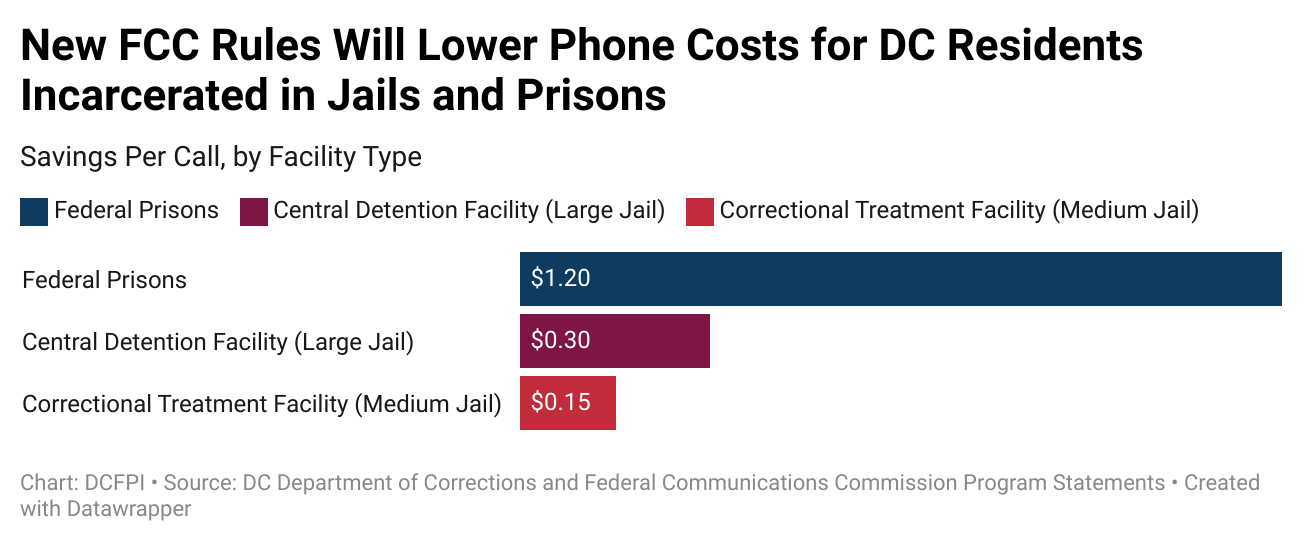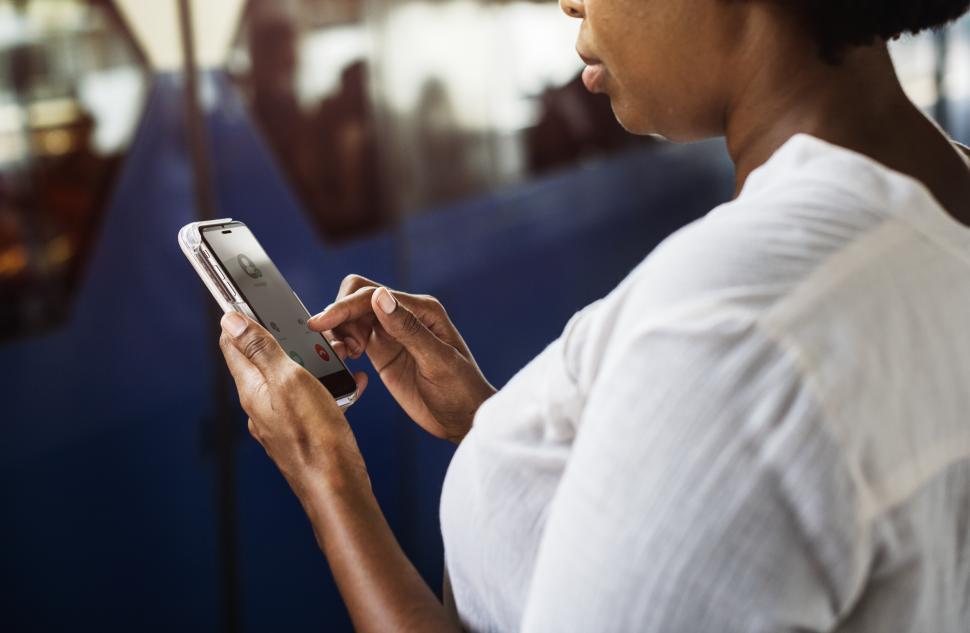Nearly 1.5 million people who are incarcerated and their loved ones are expected to save $500 million each year in lower phone and video costs at jails and prisons across the US, due to recent rule changes approved by the Federal Communications Commission (FCC).[1] The FCC will cut phone rates by more than half in many US jails and prisons starting in 2025, freeing up a portion of the extremely limited resources that people in the system have for buying necessities, like soap and toothpaste. DC should go a step further and eliminate fees for phone and video use in local jails in order to reduce the harm of extractive costs in the criminal legal system that primarily impacts Black people and those with low incomes.
Communication fees are a primary method of resource extraction within jail and prison systems that force primarily Black and brown individuals and families to bear the costs of their own incarceration, as the DC Fiscal Policy Institute documented in a recent report. Centuries of dehumanization, segregation, criminalization, and incarceration are evident in the racial disparities within criminal legal systems today: While Black residents represented 45 percent of DC’s population in 2023, they represented nearly 90 percent of people incarcerated in DC Department of Corrections (DOC) facilities and about 95 percent of those in federal Bureau of Prisons (BOP) facilities.
Lower call fees in jails and prisons will allow for more frequent communication among people incarcerated and their support systems. The new FCC rule caps phone rates between $.06 and $.12 per-minute, depending on the type and size of the facility (Table 1). Phone rates for a 15-minute call will reduce by $1.20 in prisons. For jails, the FCC’s changes introduce more variance into the phone rates based on population size, with the rate cap now increasing as the size of the facility decreases. People incarcerated in jails will save up to $1.35 to $2.10 per 15-minute call under the new rules—roughly the cost of one bar of soap or toothpaste from the commissary in DC jails. The FCC also initiated temporary rate caps on video calls and plans to approve permanent caps down the road.

The lower rates at prisons will particularly benefit DC residents incarcerated at BOP facilities as nearly half of them are located more than 500 miles away from DC; they are more dependent on calls to stay in touch with loved ones compared to in-person visits. For people in DC jails and their families, the new caps will only reduce communication costs between $0.15 and $.30 for a 15-minute call (Figure 1). These savings will be less comparable than facilities in many other jurisdictions because DC DOC currently sets the price of a phone call at $.08 per minute, well-below the current cap. The new rates will start in January 2025 at the Central Detention Facility (a large jail) and in April 2025 at the Correctional Treatment Facility (a medium jail).

Even with these reductions, the price of the calls will remain a considerable burden on people who are incarcerated and continue to disproportionately harm Black families. Surviving incarceration is expensive: on top of phone calls, they also must pay for necessities, such as hygiene products, food, and other goods purchased through the commissary. For people without outside monetary support, these costs can put these items out of reach, especially given the exploitative wages incarcerated workers earn (for those incarcerated in local jails, workers earn between $3 or $4 per day, or a maximum wage of $.50 per hour).
Ensuring people can maintain contact with loved ones while incarcerated is essential to their well-being and benefits society, research shows. Consistent communication with family and friends reduces anxiety and depression among incarcerated individuals while also improving relationships, especially among parents and their children. Moreover, maintaining close contact with loved ones has been linked to reduced rates of reincarceration, particularly for incarcerated women.
Given the benefits of maintaining contact with loved ones and the racist harm that phone fees cause, DC should eliminate fees for phone and video use in local jails. DC lawmakers could fund a program that offers free calls to people incarcerated in its jails. For example, the DC DOC could establish daily or weekly limits on the number of free calls allowed by residents housed in local facilities to manage call volumes and keep costs lower. The BOP temporarily provided free calls nationwide under the CARES ACT in 2020, along with other reforms to improve safety including allowing many people to serve out their sentences under home supervision. California, Connecticut, and other states made all calls from state prison facilities free permanently. DC should work to adopt similar reforms, which would benefit Black residents and others incarcerated and could also improve safety for all.
[1] The FCC is an independent US government agency that regulates interstate and international communications by radio, television, wire, satellite, and cable in all 50 states, the District of Columbia and US territories.

